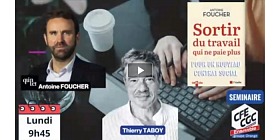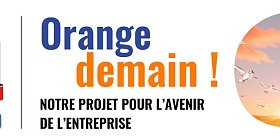Accord mondial Santé-Sécurité-Qualité de Vie au Travail: où en sommes-nous ?
Rédigé par Thierry Meurgues le . Publié dans Conditions de Travail et Santé.
[French version here/English version below]
Dans le cadre du Comité de Groupe Monde des 11, 12 et 13 avril 2018 à Casablanca au Maroc, la Direction a inscrit un point à l'ordre du jour relatif au suivi de l'accord mondial Santé-Sécurité du 21 novembre 2014, et dont la mise en oeuvre avait été présentée lors de la séance plénière du Comité de Groupe Monde de mars 2016 à New Delhi en Inde.
Trois membres de la Direction se relaient pour présenter les diverses étapes du suivi de l'accord de référence:
- Mariana GUEZ, Docteur en médecine et responsable de la SSQVT (Santé, Sécurité et Qualité de Vie au Travail) à l'international
- Pascal FOULACHON, Ressources Humaines de la zone OMEA (Orange Moyen-Orient & Afrique)
- Christophe PUAUX, Directeur Europe de la performance sociale et de l'éthique
En premier lieu, la Direction décline le plan de formation des CSS (Comités Santé-Sécurité) sur la zone OMEA, ainsi que les différents modules qui lui sont associés, de la formation des binômes moteurs des CSS jusqu'à l'aide et la mise en place des plans d'action des CSS, en passant par la formation, sur 2 jours, des autres membres des CSS.
Chronologiquement, l'année 2016 a été consacrée au déploiement des formations, regroupées en 6 séances au profit de 14 CSS et 62 personnes. L'effort de formation et de déploiement a été maintenu en 2017, en particulier sur les filiales récemment intégrées, avec à nouveau 6 séances, profitant à un total de 10 pays et 59 personnes, notamment à Madagascar, en Tunisie, au Maroc, en République Démocratique du Congo, en Jordanie, en Egypte, au Burkina-Faso, au Liberia, au Botswana et en Sierra-Leone. En 2018, la même démarche sera poursuivie avec la planification d'autres sessions de formation, à la fois sur site (Cameroun, République Centrafricaine), mais également à distance (pour les autres pays cités précédemment).
Pour garantir une formation efficace des personnels relevant des CSS sur le périmètre OMEA, un groupe Plazza dédié a vu le jour en 2017, et dont la consolidation d'une animation paritaire est en cours. Un module e-learning est également en construction, permettant de maintenir à niveau, voire de s'approprier, ses connaissances relatives aux fondamentaux de la SSQVT, des termes de l'accord mondial Santé-Sécurité, ou encore aux missions des acteurs de la SSQVT.
S'agissant de la déclinaison européenne de l'accord mondial Santé-Sécurité, un état des lieux, mené conjointement par 3 représentants de la Direction et 3 représentants des organisations syndicales signataires de l'accord, s'est déroulé en 2017 en Espagne et en Pologne, au travers de deux missions permettant de s'assurer de l'appréciation locale du niveau de déploiement de l'accord, mais également d'identifier des axes d'amélioration. Des visites à l'identique sont prévues en 2018 dans deux autres filiales européennes du Groupe.
Enfin, un certain nombre d'indicateurs (KPI) de suivi de l'accord ont été mis en place, tels que, par exemple, le nombre d'accidents de travail ou de trajet ayant entraîné un arrêt de travail, le nombre d'accidents de travail ou de trajet ayant entraîné le décès du salarié, ou encore le nombre de journées de travail perdues en raison d'accident du travail ou de maladie. Ces indicateurs permettent au Groupe de se conformer aux dispositions de la loi sur le devoir de vigilance des entreprises (Loi n° 2017-399 du 27 mars 2017 relative au devoir de vigilance des sociétés mères et des entreprises donneuses d'ordre).
D'une manière générale, la mise en oeuvre de dispositifs suivis permettant d'améliorer, voire de créer dans certaines filiales, les conditions de santé, de sécurité, et de qualité de vie au travail des salariés, dans toutes les filiales étrangères où le Groupe Orange est présent, a recueilli un très large consensus parmi les membres du Comité de Groupe Monde. Des axes d'amélioration sont par ailleurs identifiés, rappelant que les efforts doivent rester constants en la matière. Le Cameroun, par exemple, a fait part de sa surprise de découvrir l'existence de ce plan de formation et de prévention, le relais local, dans certaines filiales, en termes de communication et d'information, demeurant à l'évidence très perfectible.
[English version]
Within the framework of the World Works Council of April 11th, 12th and 13th, 2018, in Casablanca, Morocco, the Group Management has included an item on the agenda relating to the monitoring of the global health and safety agreement of November 21st, 2014, and whose implementation was presented at the plenary session of the World Works Council in March 2016 in New Delhi, India.
Three members of the Board take turns to present the various stages of the follow-up of the reference agreement:
- Mariana GUEZ, Doctor of Medicine and Head of SSQVT (Heath, Safety and Quality of Life at Work), international
- Pascal FOULACHON, Human Ressources of OMEA (Orange Middle-East & Africa)
- Christophe PUAUX, Europe Director of Social Performance and Ethics
First of all, the Management declines the training plan of the CSS (Health and Safety Committees) on the OMEA zone, as well as the various modules associated with it, from the training of the CSS driving pairs to the help and the implementation of the action plans of the CSS, through the training, over 2 days, of other members of the CSS.
Chronologically, the year 2016 was devoted to the deployment of training, grouped into 6 sessions for the benefit of 14 CSS and 62 people. The training and deployment effort was maintained in 2017, particularly for the newly integrated subsidiaries, again with 6 sessions, benefiting a total of 10 countries and 59 people, including Madagascar, Tunisia, Morocco, Democratic Republic of Congo, Jordan, Egypt, Burkina Faso, Liberia, Botswana and Sierra Leone. In 2018, the same approach will be pursued with the planning of other training sessions, both on site (Cameroon, Central African Republic), but also at a distance (for the other countries mentioned above).
To ensure effective training for CSS staff in the OMEA scope, a dedicated Plazza group was created in 2017, and the consolidation of a joint animation is underway. An e-learning module is also under construction, allowing to maintain, even to appropriate, its knowledge of the fundamentals of the SSQVT, the terms of the global health and safety agreement, or the missions of the SSQVT actors.
Regarding the European declination of the global health and safety agreement, a state of play, conducted jointly by 3 representatives of the Group Management and 3 representatives of the signatory trade union organizations, took place in 2017 in Spain and in Poland, through two missions to ensure local appreciation of the level of deployment of the agreement, but also to identify areas for improvement. Identical visits are scheduled for 2018 in two other European subsidiaries of the Group.
Finally, a number of monitoring indicators (KPIs) have been put in place, such as, for example, the number of work or commuting accidents resulting in a work stoppage, the number of accidents resulting from the death of the employee or the number of workdays lost due to an accident at work or illness. These indicators enable the Group to comply with the provisions of the french law on the duty of vigilance of companies.
In general, the implementation of monitored mechanisms to improve, or even create in some subsidiaries, the conditions of health, safety and quality of work life of employees, in all foreign subsidiaries where the Orange Group is present, gathered a very broad consensus among the members of the World Works Council. Areas for improvement are also identified, recalling that efforts must remain constant in this area. Cameroon, for example, expressed its surprise to discover the existence of this training and prevention plan, the local relay, in some subsidiaries, in terms of communication and information, obviously remaining very perfectible.
Conditions de Travail et Santé Comité Groupe Europe Comité Groupe Monde










